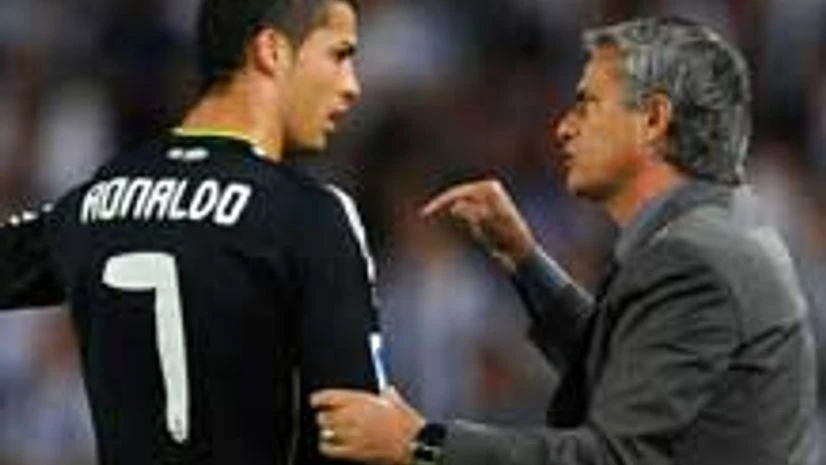THE MANAGER
INSIDE THE MINDS OF FOOTBALL'S LEADERS
Author: Mike Carson
Publisher: Bloomsbury
Pages: 320
Price: Rs 499
Jose Mourinho can reasonably lay claim to being one of the best coaches in world football. The jury of his peers would agree: both Pep Guardiola and Diego Maradona have gone on record as naming him the world's best coach, while Arrigo Sacchi of Italy has called him 'phenomenal'.
Famously nicknamed 'The Special One', Mourinho came to English public attention as the architect of Roman Abramovich's Chelsea, moving to Stamford Bridge in 2004 following Primera Liga and Champions League success with Porto. With Chelsea he won the Barclays Premier League in his first two seasons and the FA Cup in his third, but Champions League success eluded him and he moved in 2008 to Internazionale in Milan. There he won his second Champions League title during his second season, sweeping all before him to achieve the outstanding treble of domestic league, domestic cup and European league. In 2010, he moved once more - to Real Madrid, where he won the Copa del Rey in his first season and La Liga in his second. This title success was record-breaking in that real Madrid reached 100 points, scoring 121 goals in the process. June 2013 saw him return for a second spell in charge at Chelsea.
Mourinho has arguably encountered, encouraged and managed more varied and outrageous football talent than any other coach. He strides across the landscape of modern football in its new, global era, recruiting the best and motivating them to deliver on their excellent potential, and has led the greatest footballing talents in the world.
The Challenges
Confronted with the undoubted challenges of managing outrageous talent, Mourinho simply counts his blessings: "The toughest thing is when you don't have that talent! I have never had a problem with working with that special talent, never, I never had that. I never understood when people say that is a problem, or you can have a special talent but not two or three or four. I want 11 special talents! Maybe I was lucky, maybe I wasn't, but it was never a problem."
What imbalance?
The Mourinho approach to the imbalance question is typically robust. One senses there is no question of his feeling less talented or somehow awed by genius. Logically, why would a man of his track record and ability have a problem striking a healthy, balanced relationship with talented footballers? And not does he see himself as in any way superior. They are professionals together: his role is to lead, theirs to play.
His skill at handling genius became apparent during his first spell at Chelsea, where he struck up a series of friendships that anchored an array of world-class talent. He arrived at Stamford Bridge aged only 41: a comparatively small age difference from his players. "In terms of mentality, I'm not much older than them - I think I have the ability to put myself at their level. I think it is important to understand. The more you understand them the more you can lead them - there is leadership and leadership, as you know. I never liked the leadership where the boys say, 'He's my leader, I have to respect him.' I prefer them to say, 'I respect him and he's my leader.' It is a completely different thing. They can say, 'I do that because he tells me to do that and I have to.' I prefer them to say, 'I believe in him so much, and trust him so much that everything he says I want to do!' I prefer much more this kind of empathy."
It is a commonly held belief in many cultures that friendship precludes effective leadership. But closeness to the players has always been a defining characteristic for Mourinho. "Of course, many people say we can't be friends with the players. I say exactly the opposite. If you are not friends with the players you do not reach the maximum potential of that group. You have to be friends with them, but they have to understand that between friends the answer is never the answer they are expecting, or the answer they want to hear."…
Mourinho gives an example of a symbolic action that betrays very clearly the value a manager really attaches to his players: "A story from the past. I think there are two ways of travelling with the players in a plane: you travel having a business class where everybody goes in business class , or if there is no space for everybody then the players go in business class and you go in economy class with your staff. …Some time ago a coach arrived in a club and… the first thing they did was to travel executive for the manager and the staff with the players in economy. I was thinking, 'Bad start' - and I was not wrong. One of the things you must remember as a leader is your people are more important than you."
There is a compelling humility about a leader who serves his people - and inspiration when he does it with confidence, unconcerned by any imbalance.
(Excerpted with permission from Bloomsbury Publishing)

)
